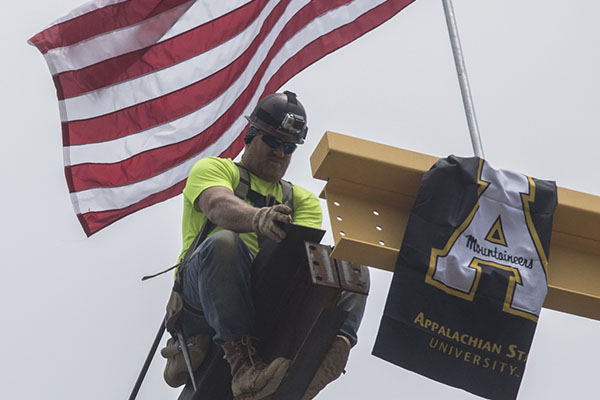Appalachian State University’s Beaver College of Health Sciences celebrated the half-way mark on construction of its new facility and honored workers with a topping ceremony in early June. More than 100 craftworkers and Appalachian leadership, community stakeholders, contractors and architects looked on as the final beam was lifted into place on the new health care facility. The "topping ceremony" is a tradition among builders and celebrates the hard work and courage of the high beam workers. The beam was carrying a celebratory evergreen, the U. S. flag and an Appalachian State University banner. Learn about the last year's accomplishments and how the facility will impact health care in the High Country from the university's chancellor, student workers, former and founding college Dean Fred Whitt and other stakeholders in the project.
About Appalachian State University
As a premier public institution, Appalachian State University prepares students to lead purposeful lives. App State is one of 17 campuses in the University of North Carolina System, with a national reputation for innovative teaching and opening access to a high-quality, cost-effective education. The university enrolls more than 21,000 students, has a low student-to-faculty ratio and offers more than 150 undergraduate and 80 graduate majors at its Boone and Hickory campuses and through App State Online. Learn more at https://www.appstate.edu.
Transcript
On June 8, 2017, a topping ceremony was held to celebrate the final steel beam being hoisted to the top of Appalachian State University's Beaver College of Health Sciences facility.
Chancellor Sheri N. Everts: This building is very important to Appalachian State University, to our faculty, staff and students. This building is also important to Boone, Watauga County and to the entire High Country. We know the inhabitants of this building will improve healthcare for western North Carolina and beyond for decades to come.
Martin Root: It took a lot of people. It took a lot of effort to get here. I was here when Dean Whitt started the college, and the very first day he came he said, “I’m going to build a building.” And I thought, “No…that really can’t happen.” And yet, here we are!
Fred Whitt: Currently, our programs here at Appalachian are housed across six to eight buildings on campus. To have everybody housed in one facility creates synergy that you just can’t duplicate anywhere else. Whether it’s the inter-professional health clinic we’ll have, which will have nurses, P.A. students, nutritionists, social workers all working together to simulate patient education. Or whether it’s interaction and research with classes in healthcare management, nutrition…just having all the players that are part of the healthcare team being educated together will be very unique.
Chuck Mantooth: And obviously it represents a tremendous opportunity for the development of our partnership with Appalachian State University. We’ve worked well in the past and I think this will just exponentially create new opportunities for us in the future.
As the building comes together, two Mountaineers have already left their mark on the project...
Benjamin Rickard is currently enrolled as a full time student at Appalachian, while also working full time as a field coordinator for Rodgers Building, Inc.
Chris Wagner, also a field coordinator for Rodgers, graduated from Appalachian in 2016.
Chris Wagner '16: For me, today means so much, being an App grad and being a part of a project that is for Appalachian. I mean, I love this school with all of my heart, and when I got on with Rodgers and they gave me an opportunity and said, “You’re going back to Boone,” I definitely didn’t argue with them. App prepared me so much for this job. I mean, I’m grateful to all my professors and anyone associated to the programs that we have today. Being out here in the field, being able to show leadership and being out here with guys who have been doing it for ten, twenty years and having their respect and their input to help me grow has been amazing.
Benjamin Rickard: It has been incredible to be a part of this project for Appalachian State. It’s a sense of pride to know that I contributed something to Appalachian State that not very many students get a chance to do.
Voice 1: Alright, you’re tightening up now. Cable up. Cable up. Alright, you’re clear man. Take it up.
Voice 2: Here it comes Josh!
(Clapping/Applause)
MR: This day is quite significant for the future of the college, the town, the community, this area of the country. This college is going to make a significant difference in the education of healthcare professionals for western North Carolina. It’s going to have a significant impact on the research into healthcare, the provision of healthcare for this part of the country. There are going to be great labs here. So healthcare in the High Country’s going to benefit in many, many ways from having this building here. We’re really pleased to look forward to the future and to see what happens. It’ll be great.
FW: I think when we look at the future of what can happen in this building, you know, I look at it today and it reminds me of a skeleton. It has all the bones, but to be able to put the meat on the bones, if you will, the muscle, various ligaments, and then the heart and the blood flow to make it breathe…that’s what will happen. As this building rises out of the ground, so do the expectations for the Beaver College of Health Sciences. And it does provide the infrastructure now to expand in programs such as occupational therapy, physical therapy…programs that are a real need in the area that we don’t currently offer.
To learn more about how you can contribute to the future of the Beaver College of Health Sciences, visit http://give.appstate.edu/healthsciences
What do you think?
Share your feedback on this story.





![How NCInnovation Is Rethinking Economic Development in North Carolina [faculty featured]](/_images/_posts/2026/02/rethinking-economic-development-600x400.jpg)






